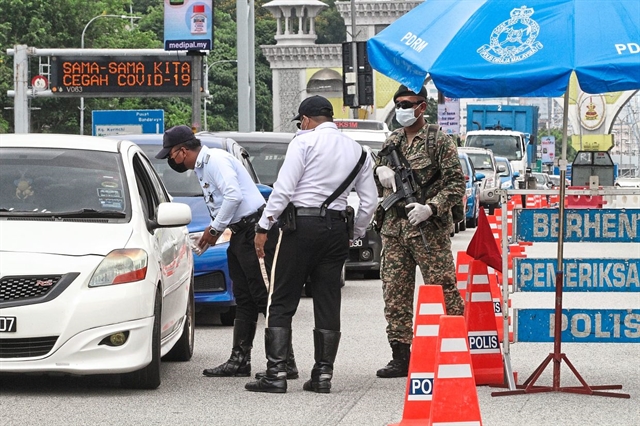 World
World


|
| Stricter restriction: Police and army personnel checking a car at a roadblock on the Federal Highway. — Photo ANN/THE STAR/VNS |
PETALING JAYA — Malaysia’s Covid-19 response which includes the movement control order (MCO) is the fourth strictest among South-East Asian countries as of Friday, according to the University of Oxford’s Blavatnik School of Government.
According to the Oxford Covid-19 Government Response Tracker, Malaysia is ranked fourth in Asean after Laos, Việt Nam and the Philippines.
“The data collected can help decision makers and public health professionals examine the robustness of government responses and provide a first step into understanding exactly what measures have been effective in certain contexts, and why,” the project’s lead Thomas Hale said.
Malaysia’s scored 85.71 on the tracker’s stringency index ties the country with neighbouring Thailand which also has the same score.
Malaysia’s measures – ranked as the 51st most strict among the 122 countries measured – is higher than some other countries, such as the United States (66.67), Britain (71.43) and Australia (71.43).
The countries with the most stringent response are among others, India, New Zealand and Qatar, with Nicaragua in last place, according to the tracker.
The score is based on measurements of seven response indicators. They include policies such as school and workplace closures, travel bans, public event cancellations, public transport closures, public information campaigns and movement restrictions.
Other six measures gauged by the tracker include fiscal or monetary measures, investment in vaccines, Covid-19 testing framework and contact tracing measures.
A higher position in the Stringency Index, however, does not necessarily mean that a country’s response is “better” than others lower on the index, according to the Blavatnik School of Government.
Malaysia imposed the MCO starting March 18 which involved, among others, a two-week closure of all government and private premises except those involved in essential services.
On Friday, the government announced an extension of the MCO until April 28.
Apart from social distancing, Malaysia has announced two stimulus packages worth RM250bil to help the people as well as businesses cope with Covid-19’s economic impact.
Việt Nam, which is ranked as one of the strictest in Asean, stepped up its social distancing measures from March 28.
Its government suspended domestic flights except for selected routes, banned public gatherings and events and shuttered non-essential services.
Until April 15, Vietnamese courts will also not accept any hand-delivered petitions or documents and allow only a limited number of court hearings with no more than 20 people attending.
Laos scored a stringency index of 100, similar to Việt Nam, ordered the temporary closure of preschools and kindergartens across the country on March 16. On March 29, a nationwide lockdown was enforced.
Third placed Philippines meanwhile imposed a month-long movement restriction in the country starting March 15.
Its government has suspended mass transport, shut down schools, imposed travel restrictions and closed its financial markets due to the rise of Covid-19 cases in the country.
While Thailand scored a similar stringency index to Malaysia, suggesting comparable restriction measures, its “blanket travel ban” may be one of the policies which differentiates the two.
From March 22, travellers to the kingdom are required to present medical certificates and insurance policy for Covid-19, the Bangkok Post reported.
On April 2, Thailand also introduced stricter movement controls which include a six-hour night curfew as well as imposing entry bans – including on Thais – for two weeks.— ANN/THE STAR/VNS




